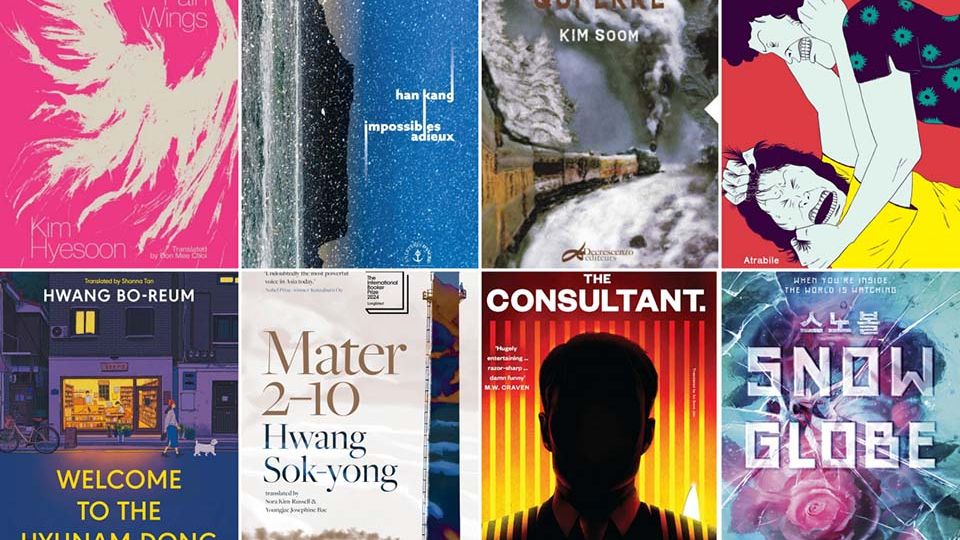July 10, 2024
SEOUL – Korean literature continues to make notable strides on the global stage this year.
Three Korean works have won international awards and five more have been nominated in the first half of 2024, according to the Literature Translation Institute of Korea.
Acclaimed poet Kim Hye-soon’s collection “Phantom Pain Wings,” translated by Don Mee Choi, won the poetry prize at the National Book Critics Circle Awards in the US in March. Kim was the first Korean to receive the prestigious award. “Phantom Pain Wings,” published in 2019 in Korean to mark Kim’s 40th year as a writer, explores war trauma and collective grief through a unique narrative technique.
Booker Prize-winning Han Kang’s latest novel “I Do Not Bid Farewell,” translated into French by Choi Kyung-ran and Pierre Bisiou, won the Emile Guimet Prize for Asian Literature in March. Its English edition, titled “We Do Not Part,” is set for release later this year. This marks the novel’s second French literary accolade, following the Prix Medicis for foreign literature in November 2023.
Additionally, Kim Soom’s “The Wandering Earth,” (“La Terre qui erre” in French) translated by Choe Ae-young and Anna Bellemin-Noel, was considered for the Emile Guimet Prize but did not make the final shortlist.
In the Emile Guimet Prize’s graphic novel category, Ma Yeong-shin’s “Moms,” translated by Lee Hyon-hee, was one of two finalists in the award’s inaugural year. The darkly funny book that follows three middle-aged women, reexamining romance, lust and gender norms, was also recognized as a candidate for the official selection of the 51st Angouleme International Comics Festival, although it did not secure an award.
Hwang Bo-reum’s “Welcome to the Hyunam-dong Bookshop,” translated by Makino Mika into Japanese, won the Japan Booksellers’ Award, also known as the Bookstore Award. The annual Japanese literary award is decided on votes by bookstore clerks from all over Japan. Since the translation category was launched in 2012, this is the third Korean novel to win, following Sohn Won-pyung’s “Almond” in 2020 and “Counterattack at Thirty” in 2022.
Hwang Sok-yong’s intergenerational epic “Mater 2-10,” co-translated by Sora Kim-Russell and Youngjae Josephine Bae, was shortlisted for the International Booker Prize. The novel spans a century, depicting the lives of three generations of rail workers and a laid-off factory worker in Korea.
Im Seong-sun’s crime thriller “The Consultant,” translated by Brother Anthony (An Seon-jae), was shortlisted for a prestigious crime fiction award recognizing excellence in thrillers, suspense, and spy fiction.
Beyond awards, Park So-young’s dystopian novel “Snowglobe,” translated by Joungmin Lee Comfort, reached the New York Times bestseller list upon its release and also topped Amazon and New York Times’ young adult literature rankings.
LTI Korea attributed the sustained global interest in Korean literature to its presence in major literary awards. Since Han Kang’s “The Vegetarian” (translated by Deborah Smith) won the International Booker Prize in 2016, seven Korean works have been nominated, with three consecutive nominations from 2022 to 2024 — Bora Chung’s “Cursed Bunny” translated by Anton Hur (2022), Cheon Myeong-kwan’s “Whale” translated by Chi-Young Kim (2023) and Hwang’s “Mater 2-10” (2024).
Established in 2014, LTI Korea’s Translation and Publication Grants for Overseas Publishers program received 160 applications in the first half of 2024 alone, with the number for the whole of 2024 expected to surpass last year’s 281 applications. This marks a significant increase from the 13 applications received in the inaugural year, reflecting growing international interest in Korean literary works, said an LTI Korea official.


